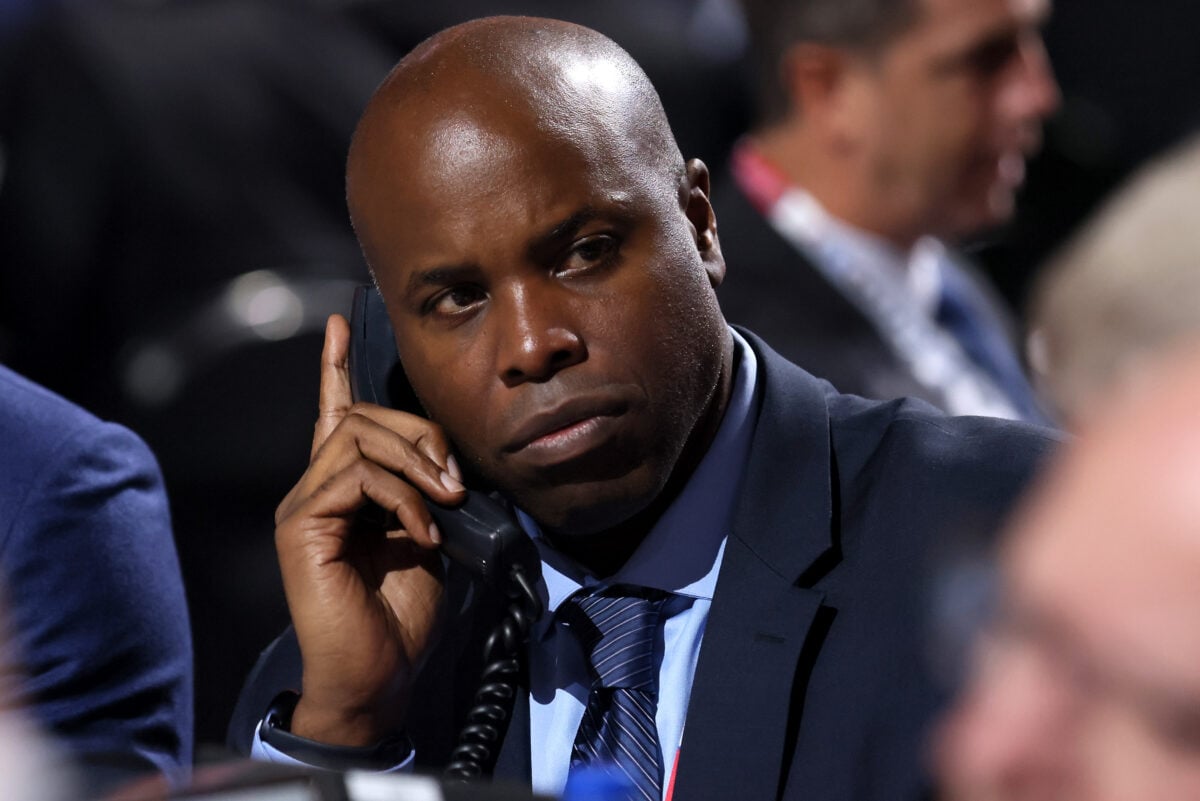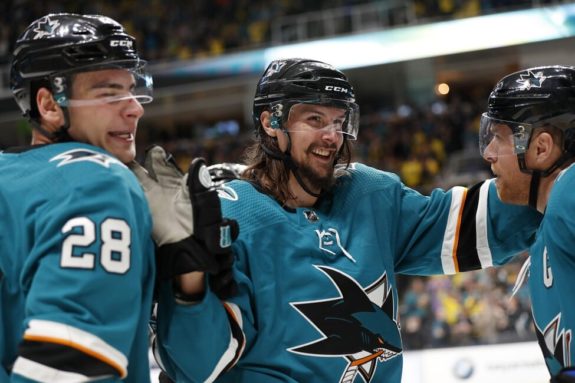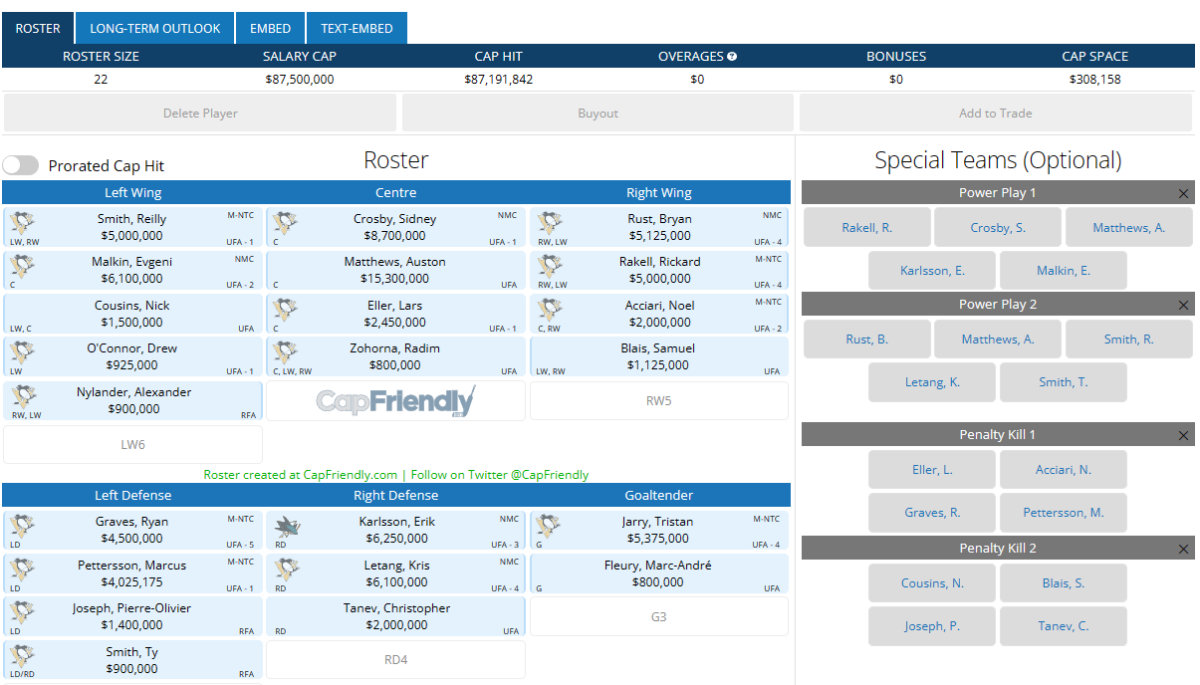“For people who think we’re going to eat 50% of his contract and all this type of stuff, it’s probably not going to happen,” – Mike Grier, San Jose Sharks general manager.
“When there’s a player like that who becomes available, especially with a core group (like this), I think it’s incumbent on me to reach out and see if there’s a fit for us” (from “With eyes on Erik Karlsson, Penguins’ Kyle Dubas goes on a spending spree — what’s next?” The Athletic, July 1, 2023). – Kyle Dubas, Pittsburgh Penguins President of Hockey Operations when asked if he is interested in acquiring Erik Karlsson.
It is hockey’s current worst-kept secret: Erik Karlsson is on the market, and Pittsburgh is a top potential destination.
Meanwhile, up north…
As The Old Prof notes, Auston Matthews’ next contract with the Toronto Maple Leafs may be worth $13.5 million per season.
The only thing is…no contract has been signed.
More rumblings out of Toronto state that there is confusion around who will sign first between Matthews and William Nylander. The fact that this is even a conversation, my friends, is the wrench in Toronto’s equation that Pittsburgh can take advantage of.

Nylander is as tough a contract negotiation as there is in the NHL. In all likelihood, his contract negotiations will drag well into the season, which for a litany of reasons (injuries, a great or bad season, how it feels to be close to being an unrestricted free agent), could lead to Nylander not signing before becoming a UFA next summer. If Nylander doesn’t sign, does it give Matthews pause? Does Auston sign in March for $13.5-14 million annually and continue the challenge of playing in the Toronto market, or does he see the opportunity to make more money in a market that does not feature the pressure which Toronto does?
In my best Jim Ross voice…
Bah gaw, that’s Kyle Dubas’s music!
Last week, we noted the strong relationship between Pittsburgh’s President of Hockey Operations and Matthews’ management group, which, let me be specific, is very strong. Dubas knows that Matthews is potentially available in less than a year, and Matthews knows that the door to the NHL landscape is open next summer.
It’s likely no coincidence that not only has Dubas not re-signed Jake Guentzel, but there has also been zero news about contract discussions between the Penguins’ brass and Guentzel’s agent. Considering the fact that Guentzel has been the most productive winger for Pittsburgh and is Sidney Crosby’s primary running mate, that silence speaks volumes. Again, no contract has been signed.
Dubas is saving his money.
So, with that in mind, let’s spend Pittsburgh’s money on both Erik Karlsson and Auston Matthews and see if there’s any left over to afford water on the benches.
Working Backward, Starting With Matthews
As noted last week (link below), I think that the allure of a four-year contract worth over $15 million per season, especially one that takes Matthews away from the Toronto media pressure cooker, would be enough of a thought to get him to free agency. Having that number in mind ahead of time is essential budgeting, making sure there’s enough money available when it’s needed. To make this possible, though, Dubas has to deftly navigate the San Jose situation, which brings us back to the start of the article.
The Dubas-Grier Dance
If you pay attention to how NHL general managers speak, they often say as much with what they don’t say as what they do. As noted in the above quote, Sharks’ GM Mike Grier is not going to pay the full 50 percent of Erik Karlsson’s cap hit. However, he did not say he wouldn’t come close.

If you’ve read my profile, you know that my day job is with a tech company, and contract negotiations are a substantial part of that job. So let’s gaze into the crystal ball at what this conversation between Kyle Dubas and Mike Grier would look like.
Dubas: We’re interested in Karlsson, but we can’t pick up his entire contract.
Grier: Well, I’m not covering 50 percent of it.
Dubas: How close to 50 percent will you cover?
Grier: How many first-round draft picks are you willing to give up?
Three. The answer is three.
I can see the comments section now…
“That’s too many!”
“Are you crazy? That’s our future!”

While acquiring Karlsson is not my first idea, there are multiple reasons why it makes sense. To start, if Karlsson could produce 101 points on the seventh-worst offensive team in the NHL last season, imagine what he could do on Pittsburgh. It stands to reason that his season last year on a good offensive team would have been worth at least 120 points, if not more. That’s Bobby Orr/Paul Coffey territory, and even at age 33, that has real value.
Related: Penguins Could Be a Serious Destination for Matthews in 2024-25
Two good years of Karlsson alone is worth three first-round draft picks. The other two are either bonuses if he stays healthy or they lead into this next part of the trade. The idea that Karlsson’s play will inevitably decline, and he will be far more likely to be hurt more often during the final two years of the contract, is leverage for Dubas to extract some value back from San Jose.
Any good general manager covers themselves on the back end of the trade for an imperfect player. In this case, the coverage is three-fold:
- Nearly 46 percent of Karlsson’s contract stays in San Jose
- A mid-tier San Jose prospect who has a legitimate chance to be an NHL player
- San Jose taking on a bad Pittsburgh contract
San Jose covering 45.6 percent (45.65217391 percent, to be exact) of Karlsson’s contract brings Karlsson’s cap hit on Pittsburgh to:
$6.25 million.
Here is what that deal looks like:

Not only is that a much more desirable number at which to take on Karlsson at this age and risk, but it also, very ironically, happens to be the exact cap hit that Jeff Petry currently makes.
The Petry Dilemma
Now, not for one second do I think that Petry will wave his modified no-trade/no move clause to go to San Jose. However, once Petry gets asked to present Pittsburgh with his list of 15 teams that he cannot be traded to, Pittsburgh will also know which 17 clubs Petry can get dealt to. As Petry still has some value, I do not think it would cost a first-round draft pick (or more) to move him, even with two years left on his contract. Perhaps a second or a third-round draft pick and a prospect should be enough, as the team that is willing to acquire him will want him for a reason.
In this case, the Florida Panthers only have two defensemen (and one restricted free agent) for 2024-25. Their favorable taxation laws for athletes (one of the reasons why players like Matthew Tkachuk are willing to play there) and the fact that last season they were in the Stanley Cup Final make a strong argument for Petry to not have Florida on his no-trade list and be willing to be traded there even if they are. This is what that deal looks like:

Add in a trade of Jan Rutta and Matt Nieto to a team that needs defensive depth and is always looking for experienced grit (in this case, Boston) for a second or third-round draft pick, and the team is complete. If this isn’t your first time visiting the land of the rebuild, you’ll likely recognize this final roster, which would look something like this:

As a quick note, I can understand people wondering about having a $15 million second-line center and how that’s, ahem…not ideal. To clarify, I have Crosby in the first-line center position out of deference to a player who is somewhere between the fourth and sixth greatest in NHL history and who is still playing at an elite level.
Matthews is a more productive overall player today, and a line featuring both Matthews and Evgeni Malkin is, of course, a first line on any team, including this one. The reality is this version of Pittsburgh would have two first lines, and CapFriendly doesn’t provide a graphic with two first lines (which I’m sure we’ll fix once they sponsor this article).
Compared to last week’s team, the Karlsson upgrade over Petry clearly makes this team stronger, even with some minimal bottom-six downgrades (I still like Zohorna, not someone to sleep on). Pittsburgh’s goal is clearly to extend the window for this team, and adding today’s Karlsson would certainly do that. This Pittsburgh team can barely, yet clearly, fit both Karlsson and Matthews under the cap in 2024-25. The question is, can Kyle Dubas make magic happen?
